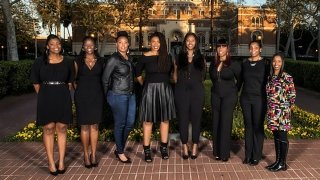“Writing is a solitary job.” These words were penned by William Faulkner, but the sentiment is something that many ABD (all but dissertation) students can relate to. However, like Faulkner, Airies Davis EdD ’16 didn’t think writing needed to be a lonely act. In fact, as she entered the dissertation writing phase, she went out of her way to ensure that it was not.
Davis came to USC Rossier School of Education from the business sector—she earned her MBA from the University of Illinois at Urbana-Champaign—and early on, she became involved with a number of organizations at USC. But one thing was missing: “support for people of color, and others, towards completing their degrees,” Davis says. So, she sought to change that.
“My original intent,” Davis says, “was to build a mastermind group,” a peer-mentoring group that helps members navigate and discuss professional and personal milestones. Davis started by pulling together several women from her cohort. They didn’t all know one another but quickly created a community.
The founders, Davis and seven other USC Rossier doctoral students—Crystal Adams EdD ’16, Bathsheba Brutus EdD ’16, Marcedes Butler EdD ’16, Rosalind Conerly EdD ’16, Marquisha Flowers EdD ’16, Brenda Green EdD ’16 and Khalisha Jefferson EdD ’16—named the group “JENGA,” Swahili for “to build.” It officially became recognized by the Graduate Student Government in 2016. Evelyn Felina Castillo EdD ’11, doctoral support specialist at USC Rossier, serves as faculty adviser.
During the process of founding JENGA, each woman chose an adinkra symbol that embodied “where we were at the moment, as a marker, almost, of our experience,” Conerly says. Adinkra symbols, which originated in West Africa and represent concepts or aphorisms, are commonly found on fabrics and decorative items. The group wanted to incorporate this imagery in recognition of their African diaspora identity. Butler chose the Fawohodie, symbolizing how independence comes with responsibilities, “because it reminds me of the importance of being self-sufficient while being in the position to help others out.”
"The ultimate goal of the organization is persistence to graduation and getting through the dissertation process, as we know that 50 percent of doctoral students will drop out.” — Marcedes Butler EdD ’16
“The ultimate goal of the organization,” Butler says, “is persistence to graduation and getting through the dissertation process, as we know that 50 percent of doctoral students will drop out.” Through JENGA she found robust social support from her peers, something that is essential when it comes to graduation persistence.
The work of JENGA was not over after the founders graduated. They are still close and get together often to offer one another career advice, write articles together and collaborate on business ventures. JENGA also continues to thrive on the USC campus and has expanded to include doctoral students throughout the university. Butler, Conerly and Davis are current alumni advisers on JENGA’s board.
As JENGA grows, it continues to provide a support network for those writing dissertations, but it also offers guidance for students before and after the dissertation, and this includes sharing information about funding opportunities.
“We’re trying to make sure that we create a conglomerate environment where people can figure out, based on where they are, what they should be doing, and who they should be getting connected with,” says board President Kendrick Roberson, a PhD student in political science and international relations at USC. “One of the things that we know for a fact is that there are opportunities out there, but you have to apply, and the only way to apply for an opportunity is to know that that opportunity exists.”
Like many organizations, JENGA has shifted activities to the virtual realm because of the COVID-19 pandemic. Panel discussions and meetings are now conducted via Zoom, and past president Virginia “Ginny” Linenberger mailed the annual JENGA dissertation awards instead of presenting them to graduates in person. A focus for the upcoming year, Roberson says, is recruiting first-year doctoral students so that, early on, they can become part of the supportive network JENGA provides.
For the founders of JENGA, the future holds more collaborations, including a book publication, a lecture series or conference to share guidance for creating peer support networks and facilitating necessary conversations on cultural exchange and equity, and expansion beyond the USC campus to create a network for doctoral students across the globe.




